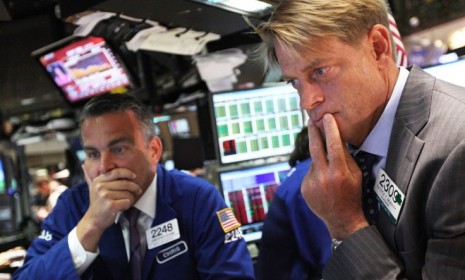The Dow's 'scary' collapse: 6 theories
Stocks took their sharpest drop in more than two years on Thursday. What caused the panic?

A free daily email with the biggest news stories of the day – and the best features from TheWeek.com
You are now subscribed
Your newsletter sign-up was successful
Financial markets sank around the world early Friday after U.S. stocks went into a "scary" nosedive on Thursday, with the Dow Jones Industrial Average falling by 513 points. It was the biggest percentage drop — the Dow was down 4.3 percent, the Standard & Poor's 500 index fell 4.8 percent, and the Nasdaq 5.1 percent — since the dark days of the 2008 financial crisis. What caused the collapse? Here are six possible culprits:
1. Wall Street hates the debt deal
The plunge Thursday capped a 10-day slump, says Stephen Gandel at TIME, that started when it became clear that Washington was close to a debt deal. That's because the deal cuts spending precisely when the economy needs government to spend more. And the savings comes largely from gutting programs that help the poor, increasing income inequality. Struggling families spend every dime they get, boosting the economy. The rich have so much already that they put any "extra wealth" into savings, where it does little to stimulate the economy.
The Week
Escape your echo chamber. Get the facts behind the news, plus analysis from multiple perspectives.

Sign up for The Week's Free Newsletters
From our morning news briefing to a weekly Good News Newsletter, get the best of The Week delivered directly to your inbox.
From our morning news briefing to a weekly Good News Newsletter, get the best of The Week delivered directly to your inbox.
2. European debt is frightening investors
The European Central Bank is trying to reassure markets, says Graham Bowley at The New York Times, but it "ended up spooking investors." The bank bought up bonds from small European countries as a show of support, but it left out Italy and Spain, "whose mounting troubles have come into the spotlight." Investors took this "as a sign that the recent rescue packages by Europe could soon be overwhelmed by the huge debt burdens in those two countries" — and they panicked.
3. Investors are freaked out about a double-dip recession
There's no great mystery — the markets are pricing in "the growing risk of a double dip" recession, says Allahpundit at Hot Air. We've just been slammed by a string of devastating economic reports showing that, among other things, the economy has essentially stopped growing, unemployment isn't improving, and manufacturing orders are down. The Obama administration isn't creating jobs, but it's scaring investors with the threat of new taxes and regulations. Add it all up and you get "total fear."
A free daily email with the biggest news stories of the day – and the best features from TheWeek.com
4. Republicans are blocking attempts to help the economy
President Obama has no shortage of ideas to put Americans back to work, says Steve Benen at Washington Monthly. But the GOP has been overcome with "madness," and it's blocking every proposal that might actually help. "This is partly due to their radical ideology, partly due to their reflexive opposition to anything the president wants, and perhaps motivated by the belief that economic suffering should be encouraged in the hopes that it will make President Obama easier to defeat next November."
5. It's finally dawning on people just how bleak things are
"Whatever weak recovery we might have hoped for," says Ezra Klein at The Washington Post, "is being hindered by global commodity prices, consumer deleveraging, fears of flagging demand in emerging markets, earthquakes in Asia, and much more." So where will the recovery come from? "As one hopeful hypothesis after another is dashed, the markets are beginning to panic."
6. The media is fueling market panic
Financial analysts chalked up the sell-off, which wiped out Wall Street's 2011 gains, to investor fear, says Dylan Stableford at Yahoo! News. But it's also possible that wall-to-wall coverage of the "historic drop" on broadcast networks and cable news could have fueled the panic. Still, some experts doubt the TV chatter had much impact. "A huge chunk of volume — and hence momentum — is now driven by machines, computers and algorithmic trading," says Dan Gross, economics editor at Yahoo! Finance. "And the computers definitely aren't watching cable news."
-
 James Van Der Beek obituary: fresh-faced Dawson’s Creek star
James Van Der Beek obituary: fresh-faced Dawson’s Creek starIn The Spotlight Van Der Beek fronted one of the most successful teen dramas of the 90s – but his Dawson fame proved a double-edged sword
-
 Is Andrew’s arrest the end for the monarchy?
Is Andrew’s arrest the end for the monarchy?Today's Big Question The King has distanced the Royal Family from his disgraced brother but a ‘fit of revolutionary disgust’ could still wipe them out
-
 Quiz of The Week: 14 – 20 February
Quiz of The Week: 14 – 20 FebruaryQuiz Have you been paying attention to The Week’s news?